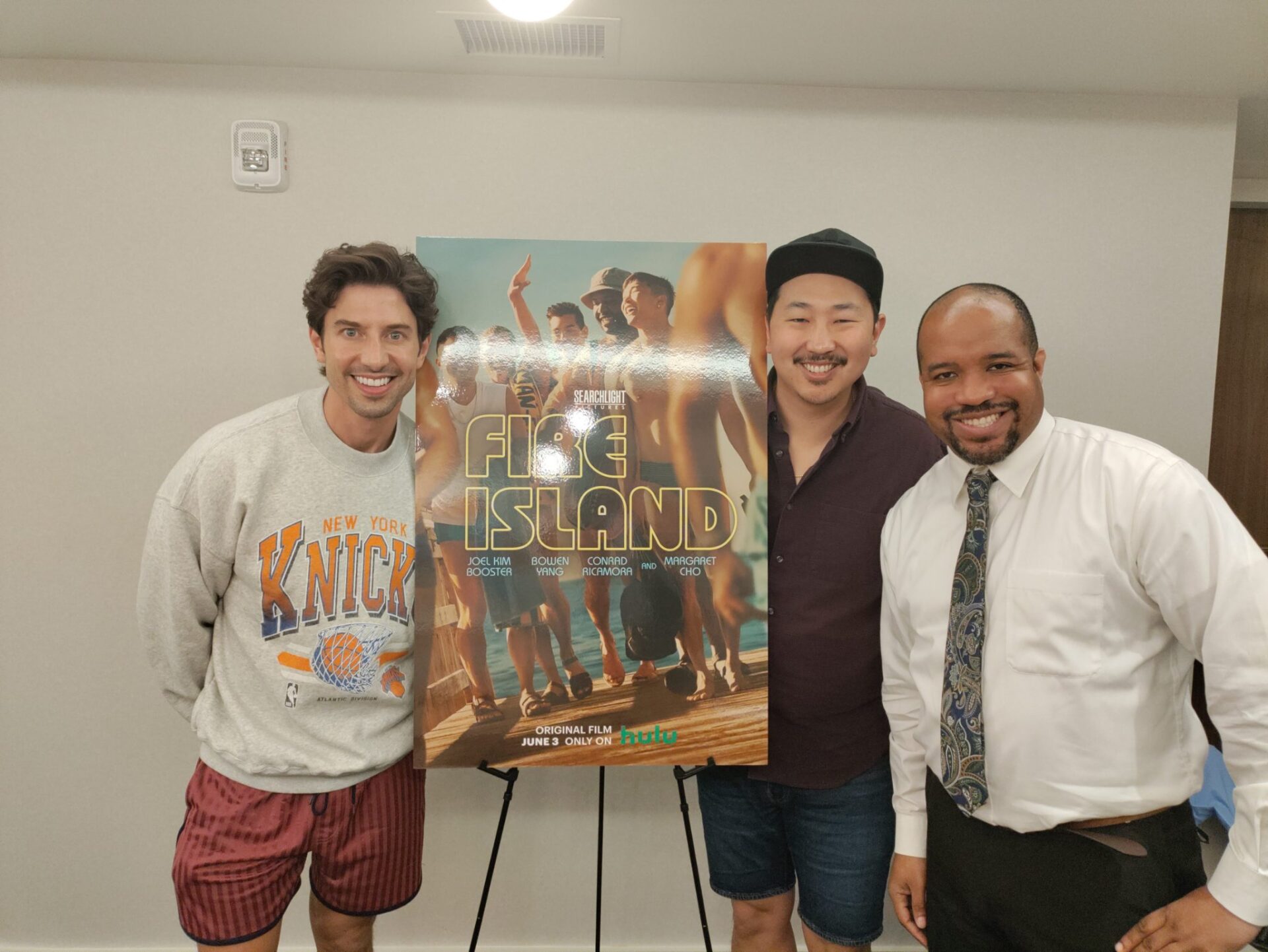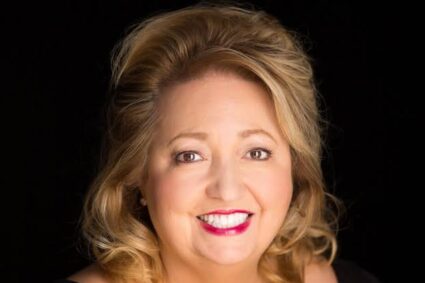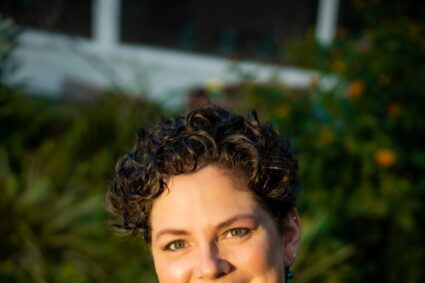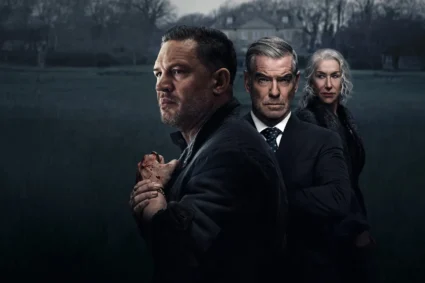
On this edition on THE INTERVUE, we’re talking about the new movie coming out tomorrow Friday June 3rd on Hulu called Fire Island.
Set in the iconic Fire Island Pines, FIRE ISLAND is an unapologetic, modern day rom com inspired by Jane Austen’s Pride and Prejudice. The story centers around two best friends who set out to have a legendary week-long summer vacation with the help of cheap rosé and a cadre of eclectic friends.
And here with me to talk about is director Andrew Ahn and actor Nick Adams!
Welcome to THE INTERVUE, gentlemen. Now, my first question is to you, Andrew. Andrew, this was an amazing film that I saw recently. And you were sparked by (Joel Kim) Booster’s cleverly crafted script from the moment you read it. I want you to tell us why.
Andrew Ahn (AA): Yeah, you know, I received the script for the feature a year into the pandemic. And you know, at that point, I hadn’t seen my friends in a long time. I haven’t gone out to a bar to drink and dance and be stupid. And I saw in Joel’s script, everything I was missing. I just loved how it focused on queer Asian American friendship. I loved that celebrated queer joy and chosen family. You know, that to me, it just feels important to make something like this right now. I found a real meaningfulness to it. And so, I’m so glad that Joel wrote it. I’m so glad that I got to direct it.
Now, Nick, you play a wonderful character named Cooper, he was the brand manager. He’s tried to break up this wonderful, budding relationship. Tell me what attracted you to the role of Cooper.
Nick Adams (NA): First, the script when I read it, I thought it was I was laughing out loud a lot. And really, again, connected with how grounded it is, for the gay community. I responded to the script because I thought it’d be fun to play a villain. I think I watched it last night with everyone in the screening here in DC. It was just crazy to see how everyone reacted to how awful he is. It was funny, because I don’t, I’m not normally playing that kind of character. I normally like sort of upbeat, friendly, in that arena.
So, this was it was just fun to be so much farther removed from myself, you know, something completely different. And to get to play with these cast members was just a joy. But I just love the script. And I fell in love with it. After our first table read the, the energy in that room was buzzing. I felt like just we were so joyful and excited. We knew we were part of something that was going to be very special. The recipe of humans felt spot on and made me just thrilled to make it.
And that’s a great segue to my next question. Staying with you, I read somewhere that you play roles that demand enormous energy and personality. And you’ve done that with “Falsettos” & “Priscilla: Queen of the Desert” one of my favorite films by the way. How does Cooper fit into that category of enormous energy and personality?
NA: He’s actually very different than those characters in I felt like he’s very subtle and sort of muted and always like, calm he doesn’t want to like show that anyone’s getting to him or bothering him. And so, it sort of took this like different kind of focus energy as opposed to generous energy which I think those characters have especially because those were in musicals and on stage, so this was a much different approach. I feel like he’s always aware of his surroundings and sort of trying to stay ahead of the game and in charge. When he doesn’t feel in charge that’s when he sort of goes off the deep end of his like this is “No, I always get what I want I’m not getting what I want like that.”
I love the Miranda Priestly, Meryl Streep energy of this you know “Devil Wears Prada”
AA: It’s so funny Nick is so different from his character feels so bad making him play this character. It’s it always seemed more fun to play the villain, right?
NA: Yes, it’s just more to work with and I and Andrew also his direction on set was very much to keep me in that vein of just try that like they’re not going to ruffle your feathers you you’re above that no one can touch you. They can’t bother your kind of energy like they’re so beneath you can’t be bothered and yeah, we tried to get those results.
Great results with this film. Now Andrew as you know this is AAPI Heritage Month right now and we’re about to go into Pride Month and I feel that “Fire Island” hits right in the middle. What does that mean to you personally to have this film in between these two great months here?
AA: Yeah. I mean, I’m super excited for it. You know, it’s scary for me too, because I hope people don’t forget about us after these two months. I really love being able to talk about this intersection of being queer and Asian American, you know, I think so often in the queer community, you know, being a person of color, being Asian American, like, you don’t necessarily see yourself represented in queer culture. And then, as an Asian American often I feel like an outsider, because I’m queer. And to have a film that celebrates both that shows two queer Asian American characters who are different from each other, have different attitudes, ideas about love and sex, I’m glad that we are showing that our culture, isn’t a monolith, that there are many different experiences.
And so, you know, I think it just so happens that it lines up well with our marketing for Fire Island. but I’m very happy to celebrate these things. And to have it do work, I’m really excited for us to be inspired, and then galvanize together and go out and try and make a more equitable world by donating to mutual aid funds, voting, engaging in civics protesting. I’m excited for all the action that can come out of, you know, the, the strength that we gain from our representation.
My next question is both for you. Now, within the last decade, strides for the LGBTQ community have been representative in television, motion picture, streaming media. And I’m gonna start with you with Nick question, what strides are needed to continue to be made in terms of representation of the LGBTQ community on screen.
NA: I think we need to continue to tell authentic stories that don’t sort of like, trivialize, or make fun of our community to sort of conform to like the heteronormative masses that we want to consume this content. I think it’s important to do work that’s for us and by us. I think that’s what’s special about this film, that it is encompassing of that.
I just think the more we see ourselves, the more normalized it becomes. I look back at when I was a kid, and I didn’t see anything. I tried to think of like a gay hero or role model when I was a kid. I just didn’t have one because it wasn’t accessible to me. And so, I look at it our society now and I think it’s so beautiful that you can turn on a streaming service, you can turn your television, you can turn on the radio, and there are queer artists everywhere. It’s a fantastic thing. And the more that it’s part of society and part of culture, the more safety that we have. I just think, the more projects we can create on bigger scales for our community, not just for everyone, but also specifically for our community, we’ll get there.
AA: I mean, I really agree with Nick and the only thing that I can add is that I understand that sometimes, mainstream media, Hollywood studio films, they might not necessarily be able to capture everyone’s experiences. I think that’s because we live in a capitalist society because we live in a society that was built on white supremacy.
Sometimes we really do need to go back to kind of grassroots and independent film land. I really hope that smaller independent films, get bigger distribution. And that more personal stories that don’t necessarily have a ton of funding can get the platform so that many, many people can see it. That to me is a big part of how we can create a more diverse cinema culture canon of queer films.
My last question is this, asides from realizing your dreams, what aspects of being in the biz has been the most rewarding so far?
AA: I think for me, it’s, it’s all about the kind of sense of cheesy, the friends we made along the way. I love that with Fire Island, I’ve gotten to meet so many talented queer people and that, we support each other, we’re excited for each other. Nick and I are on a big text chain with the rest of the cast were called “The Pantry Girls”. And it’s amazing, Conrad (Ricamora) just finished up a run with “Little Shop of Horrors”. And everybody was congratulating him. Tomas (Matos) finished up on “Hadestown”, everybody’s congratulating them. It’s so great to be able to do this with people that we love spending time with. To me is the, the greatest joy of being a filmmaker.
NA: It’s an echo that I think every project that I’ve been a part of, I’ve sort of gained this, like we talked about the film has chosen family, like this group of core friends that no matter how much time has passed, or where we go in our lives, whenever we reconnect, or we stay connected, it’s just like, no time has passed. I think that’s so important. That’s what makes life worth living is the connections that we make on a personal level like that.
I’ve also, without sort of intentionally doing this, I just leaned into who I am, like when I got out of college and have not deliberately but just, I think as a byproduct of that sort of crafted a clear path for myself in entertainment, and a lot of the projects that I’ve been a part of. So, this feels like an amazing part of the progression of my career to then be a part of this film that I think is now just like in the gay canon. I felt very emotional watching it because it really hit me the magnitude that this is gonna have, and I’m honored to be in that ensemble cast.
Fire Island starts tomorrow on Hulu on June 3rd


